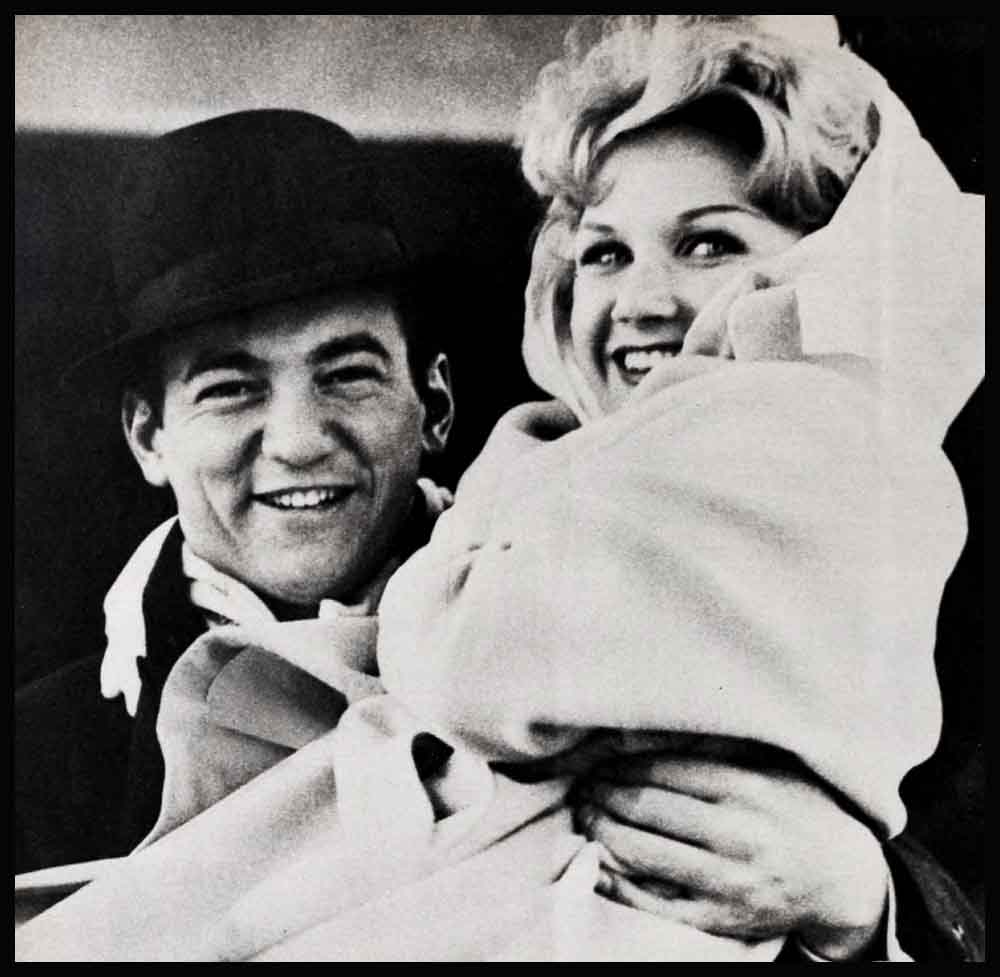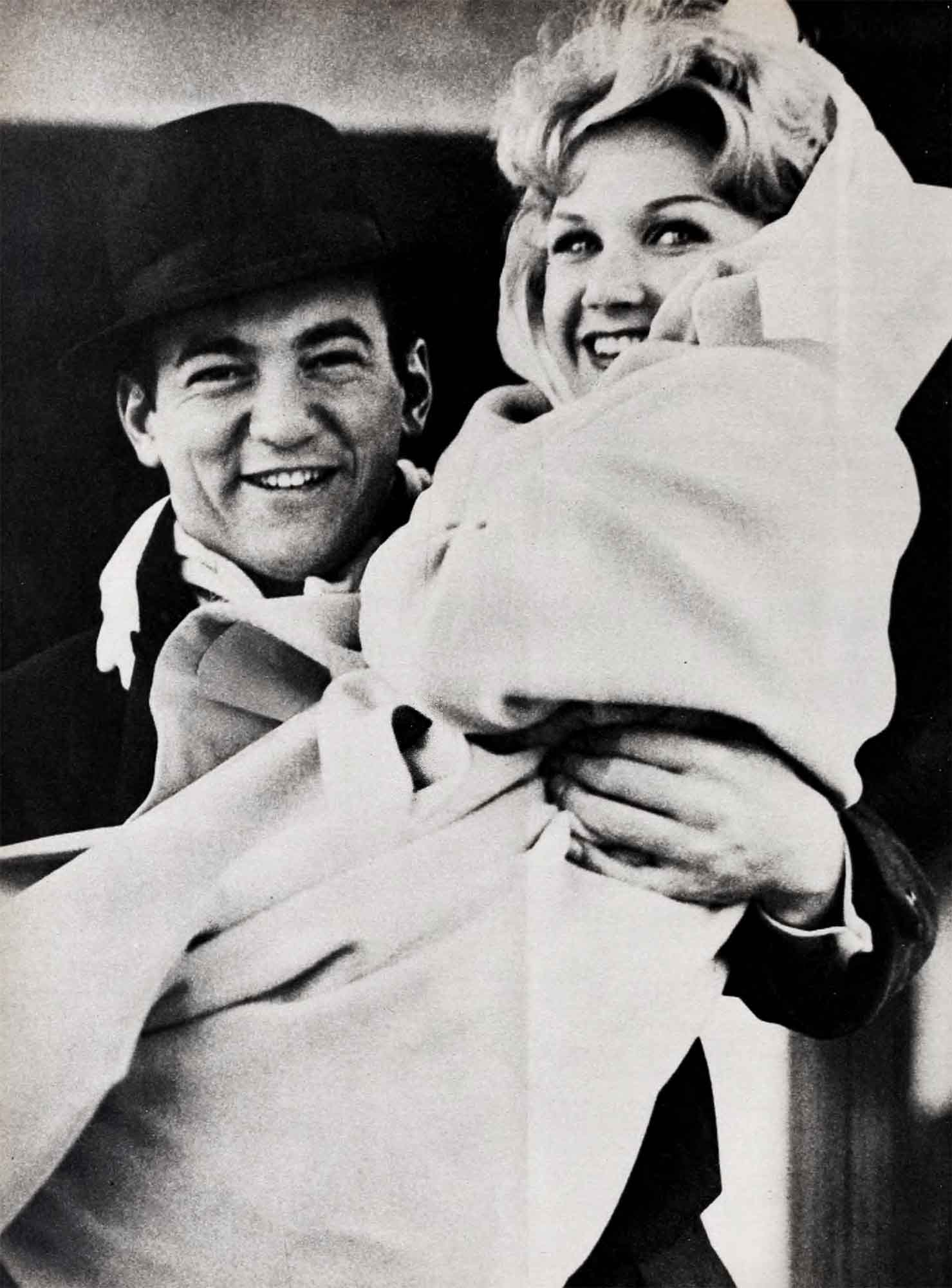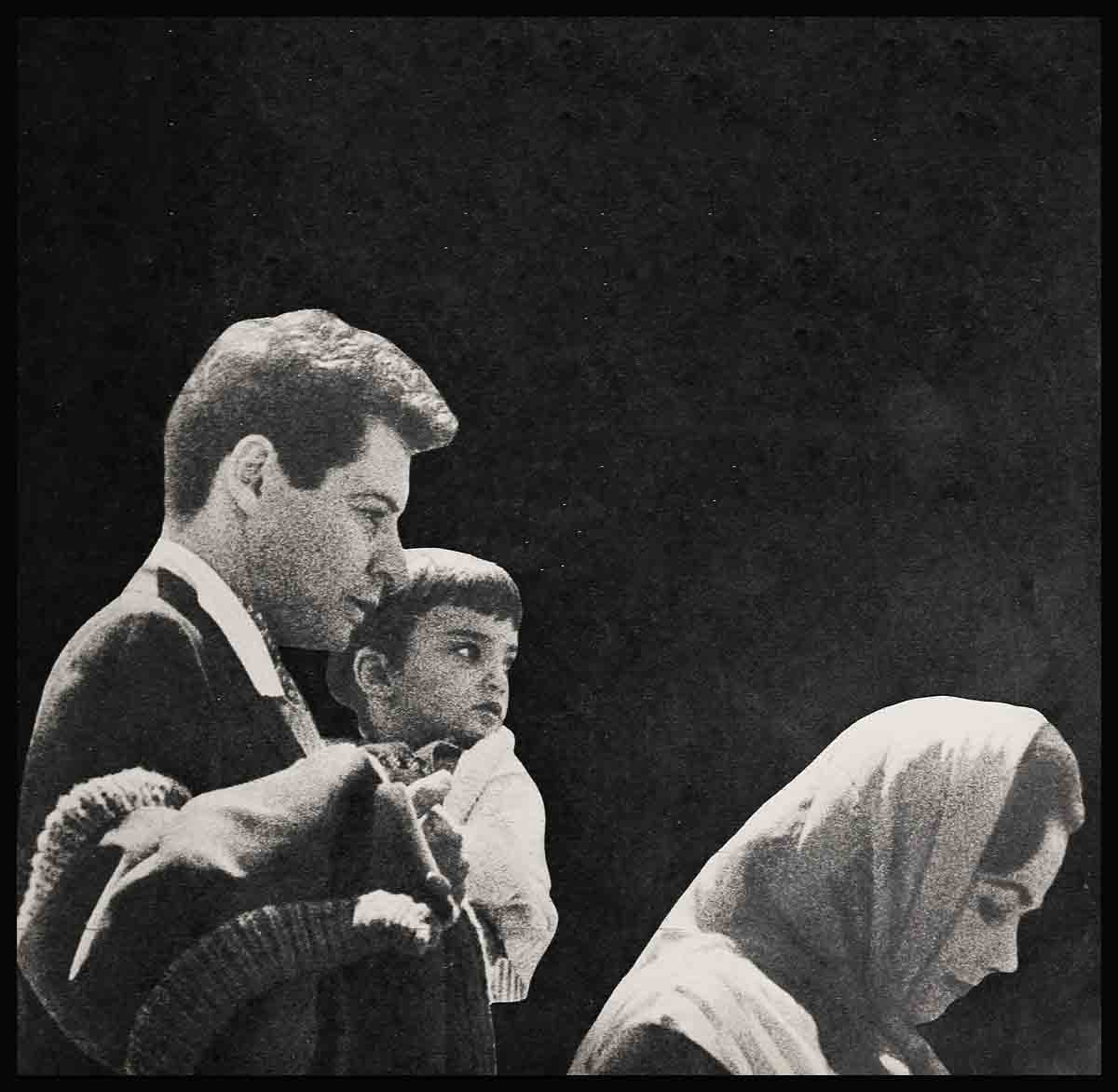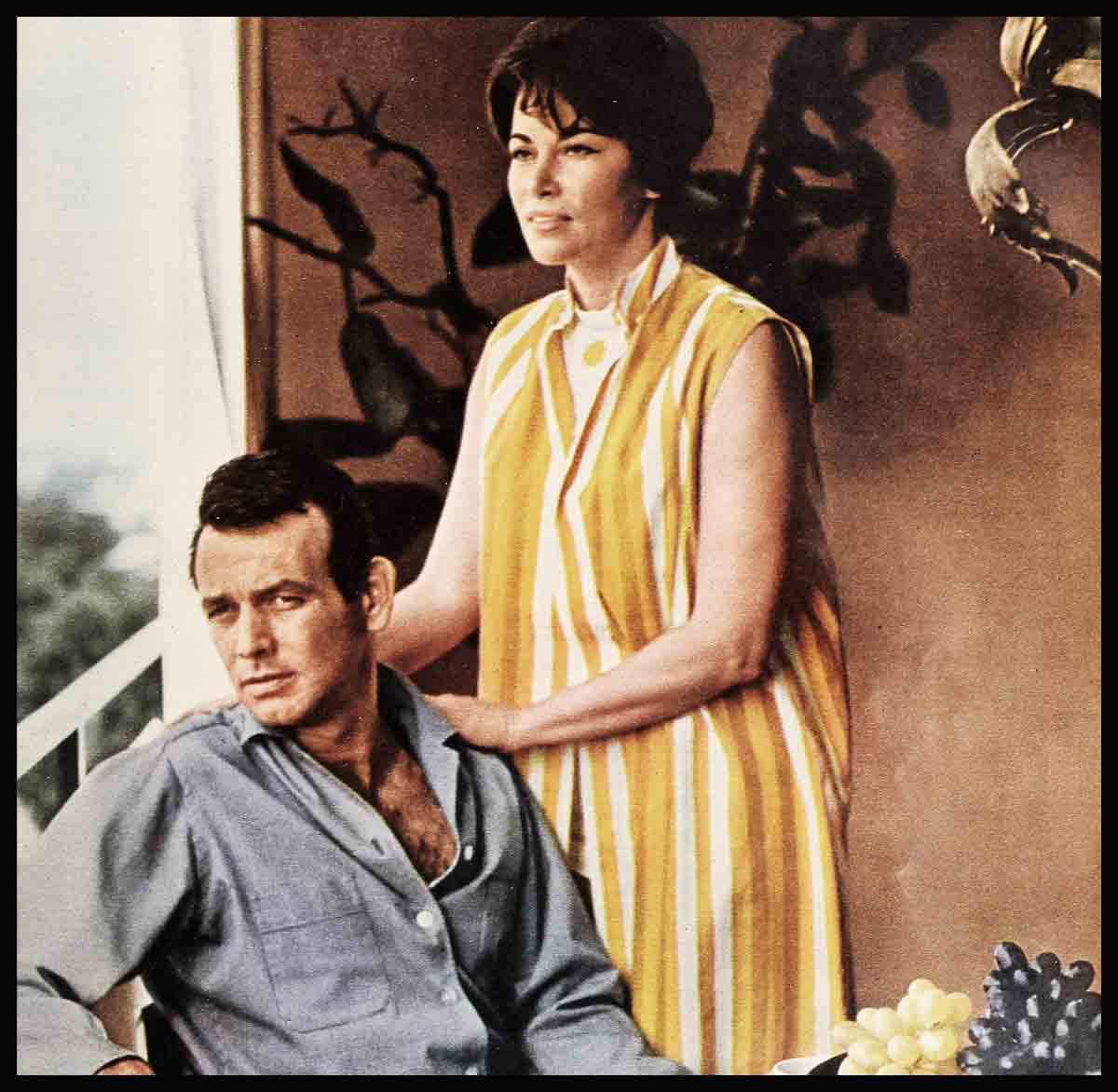
The Right To Marry—Bobby Darin & Jo-Ann Campbell
“I don’t believe it,” Jo-Ann Campbell said. “It isn’t true. It just can’t be.” She sat motionless on the couch, but her hands twisted at each other, knotting and unknotting. “It isn’t true.” But her voice trembled. “You just now made it up so I shouldn’t be mad. But it isn’t isn’t funny, Bobby. It isn’t—”
Bobby Darin stood in front of her. His face was white. “No, it isn’t a million laughs, is it, Jo-Jo?” he said. Then, very slowly, he repeated what he had said a moment before. “There’s something wrong with my heart, Baby. I’ve had it a long time. Remember, I told you I always had the feeling I’d die young?”
“Oh, God,” Jo-Ann said softly. “Oh, God.” She shook her head as if in pain, and with the gesture, the tears began. They ran down her cheeks, and she put her hands up to her face so Bobby wouldn’t see them. “I’ve got to stop,” she thought. “I’m making it harder on him. And I was cruel to him all evening. I’ve got to stop!“
But she couldn’t. The tears streamed down her face and she didn’t wipe them away.
This was going to be such a happy evening. But right from the start it went wrong. A few days before, when Bobby called her, she’d been delighted with his plans. “I’ll pick you up at seven-thirty,” he had said. “Be ready for a big night, Honey. We’ll grab a bite, check in with the crowd at a night-spot. We’ll make the scene at half a dozen if you’re game. There’s a lot of acts I want to catch.”
AUDIO BOOK
She had laughed, “That’s my boy—wants to get in everything in one night. New York’ll still be here next week, Bobby. Save some!” But actually she loved a big night as much as he did. Loved dressing up, loved hearing other singers in the clubs, and Bobby saying “These spots will feature you some day soon, Baby.” It was all fun—laughing and dancing and kidding with the friends who affectionately teased her and Bobby about the wacky way they ran their romance. But, most of all, she loved being with Bobby.
“I guess it’s ridiculous to go with a boy for two years and be unofficially engaged to him,” she thought often, “and still get the same blissful feeling, like your heart is slipping down to your toes whenever you hear his voice.” But that’s how it was, that’s how she felt. It made up for whatever else she didn’t understand about their romance, about Bobby and his odd way of being in love. It made up for everything that troubled her, without quite knowing what was wrong some-times. . . .
At seven-thirty that Friday she was ready. She sat in the living room talking to her mother and father, every now and then patting her hair into place. At a quarter to eight she glanced at the clock. Immediately her mother said, “Now, Jo-Ann, it’s a long way from Manhattan to Flushing, Long Island. He could have missed a turn-off, you know.” At eight-thirty, her father was saying how bad traffic gets on Friday nights. But the phone rang, interrupting him, and she ran to pick it up.
“Bobby?”
“Hi, Baby. Listen, I’ll be a little late. I’m sorry. Wait for me.”
“Well—sure,” she said. “But where are you? Are you—?”
“See you soon,” he said Then there was a click.
Jo-Ann walked back into the living room. “He—he got tied up.”
At ten after nine, the phone rang again. “Jo-Jo, I got snafued some more, I’ll be there as soon as I can.”
“Oh, really?” she said. The blue dress was crumpled from sitting, she was hungry, and now that she knew he was all right, she was growing angry. “What’s holding you up, Bobby? What’s her name?”
But he had hung up, again, without listening. “Just as well,” she thought, putting down the phone. “That was a stupid thing for me to say.” After all, she’d consented to Bobby’s idea that till they were married, or at least officially engaged, each was free to date other people. So she had no right to be jealous. And when she was, she’d tried never to let it show. Besides, she had no reason to imagine he was with another girl tonight. Bobby was always honest with her about who he was seeing, and when. Sometimes too painfully honest!
Then what was he doing? Having a business conference? Going over a change in a song lyric? Probably. She’d never promised not to mind when he put business before pleasure, work before play, career before Jo-Jo. As if she came second in his heart, with singing and fame and applause all tying for an easy first.
At a quarter to ten, her folks tactfully decided to visit a neighbor. They’d been gone fifteen minutes when the doorbell rang. Tight-lipped, Jo-Ann answered it.
It was Bobby. Leaning against the door frame as if he had all the time in the world. “Hello,” he said.
Just like that. Hello. “Well!” Jo-Ann said. “If it isn’t Mr. Darin, boy genius, man-about-town, a mere three hours late!”
“I’m sorry,” Bobby said. But his voice was expressionless. His eyes fastened on her briefly. “You look terrific, Honey,” he said. But the words sounded meaning-less. “Jo-Jo—I’m sorry to mess up your evening like this, but I’m beat. Knocked out. Could I—would your folks mind if I sacked out for a while?”
Without even waiting for an answer, he walked past her to the spare bedroom down the hall. Absolutely speechless, Jo-Ann watched while he shut the door be-hind him. A second later, she marched—not on tip-toe—to her own room. She stripped off the crumpled blue dress and threw it furiously on the bed. She pulled off her stockings and reached for a pair of slacks and a cotton blouse. Her earrings tumbled onto her dresser, then her choker and her bracelet. She went back into the living room, turned on the television, folded her arms and waited.
When, an hour later, Bobby emerged from the bedroom, she was ready for him. She snapped off the eleven o’clock news and let him have it! So he was tired, was he? Well, wasn’t that just too bad? She wasn’t tired. Oh, no. “All I did today was get up a quarter to seven to make it into the city for a voice lesson,” she raged. “Then did three hours of shopping for my mother, had an interview during lunch and a two-hour rehearsal after lunch. I stopped at the photographer’s, got home in time to help Mom fix dinner for Dad, and barely made it into the shower and my dress to be ready on the dot of seven-thirty for my big date with my big love!” She ran on, her words biting. Was she lying down? No, she was not. The mere fact that she was seeing Bobby was enough to pep her up. It was a pity it didn’t work the same way for him. But, then, it was a pity a lot of things were off-center where he was concerned. A real, darn shame that made her wonder why she loved him in the first place!
He waited until she ran out of breath. Then he said: “Jo-Jo, I’m sorry. I know I’ve done a lot of things you don’t dig at all. I should have told you why before this, but I just couldn’t. Now I guess I’ve got to. Only, I wish you wouldn’t stand there. Please, Honey, sit down. Listen hard. I wasn’t goofing off tonight, Baby. I was sick. Real sick.”
Then he told her the rest of it.
“Jo-Jo, there’s something wrong with my heart. .. .”
It didn’t penetrate at first. For a split second, Jo-Ann felt only that the rage she had built for three hours was draining out of her; she wondered what would come to fill the void. And then she knew.
Fear had come.
Fear that would never, never again depart. They talked, Jo-Ann with the tears pouring down her cheeks, Bobby with his white, set face and steady voice. They talked of his mother, who had died of heart-trouble. Of the day when he first learned that his heart was not quite the faithful, miraculous, perfect organ he’d always thought it was. Of the doctors’ warning to take it easy. But mostly they talked of what his secret knowledge had meant to his love for Jo-Ann.
When, finally, he went out through the door to his car, heading back to the city, Jo-Ann sat for a long time in the quiet living room. Not till she heard the sound of a key turning in the lock did she get up. She didn’t want to see anyone, not even her parents. First, there were too many pieces of her crumbled world to be put back together again. She needed time to think.
Very quickly, Jo-Ann slipped from the room. When her parents entered, she was already in her own bedroom with the lights out. But her eyes were wide open. She did not undress. She lay motionless on her bed as the long hours crept by—and she remembered. And understood. For the first time, she understood so much. . . .

They were introduced
Jo-Ann Campbell and Bobby Darin had met at a record hop in Philadelphia. They were introduced, smiled politely, listened approvingly to each other sing. They could each have walked away right then and there, and never remembered each other’s name. But when it was over, a girlfriend offered Jo-Ann a lift home to New York. She mentioned that Bobby was coming, too. “Fine,” Jo-Ann said, interested only in the convenience of getting a ride.
She and Bobby climbed into the front seat and, while their friend drove, made polite conversation. After twenty minutes, the small talk was no longer small. They were amazed to find themselves in New York. They’d been talking steadily, with mounting interest, for almost three hours.
When they said goodbye, it was like leaving a life-long friend. Jo-Ann walked into her folks’ house with a pounding heart. Now, there was a fellow a girl could really admire: talented, straight-forward, a little brash—maybe—but she liked that! It showed he wasn’t phony. She could hardly wait for him to call. For, of course, he would call. He had been every bit as interested in her as she was in him—it stuck out all over the guy. She smiled to herself, planning what she would say when he asked for their first date.
But he didn’t call. . . .
It was the first mystery of many; the first question without an answer. Oh, Jo-Ann didn’t spend all her time puzzling it out. She had plenty of other men, men who did call. But still—
Why?
A month went by. Then three more weeks. Jo-Ann had other things on her mind; a seven-week singing tour coming up, friends, dates, her folks.
The night of the Academy Awards, she arranged to watch the show on TV at the home of the same friend who had driven her back from Philadelphia. When she walked into the door, Bobby was there.
“I hope you don’t mind,” Sue whispered, as she took of her coat. “I met him on the street and he asked for you. I told him you were coming over tonight and—well, the look on his face—I just had to ask him.”
It was funny, she had wanted so much to see the Oscar show, but ten minutes after it was over, she had no idea who had won. Bobby Darin took her home that night. He didn’t ask straight out for a date. He talked around it. She didn’t know whether to be glad or sorry that she had to say, “I’m leaving for a singing tour.” But when she came back from it, they began to see each other regularly. With every date, they fell more and more in love. They knew each other so well that, after a while, Jo-Ann felt free to ask, “Bobby, after we met, why didn’t you call me for so long? Two months, almost. And then I was away for seven weeks on tour—almost four months out of our lives when we could have known each other and didn’t.”
“Now,” Bobby said, “is that a proper question? You’re not even supposed to let on you knew I existed before I called—’tain’t lady-like.”
“But why?” Jo-Ann persisted. “I mean—if you hadn’t happened to bump into Sue on the street, you might never have called. Is that it?”
Bobby picked up her hand and rubbed his thumb along her fingers. “Yes,” he admitted finally, “that’s it. I wouldn’t have called you.”
“Didn’t you like me?” Jo-Ann asked, hurt. “Didn’t you like me at all?”
Bobby sighed. “I’ll tell you why I didn’t call you, Jo-Jo,” he said. “But I don’t think you’ll believe it. It was because I liked you so much. And I just didn’t want to like anyone. Not then! Not that way.”
Believe it? She didn’t know. He never lied to her, and yet—why should a man be afraid of falling in love? Especially Bobby. He wasn’t married, wasn’t even going with anyone. He didn’t have much money, but surely he could see she wasn’t the kind who cared.
Finally, she let it drop. What difference did it make what happened before they fell in love? Now was all that mattered.
Now she knows
But now, lying on her bed in the dark, she knew the real answer. She had just heard it from Bobby’s own lips:
“The doctors told me to cut down, Jo-Jo,” he told her. “I was to take it easy if I wanted to last longer. But you know how I want to get somewhere, to be some-body. So if maybe I couldn’t have all the time in the world—it just meant I had to work harder, faster. Then I spotted you—and you were my kind of girl. But you’re not the kind a guy can pick up and drop, Jo-Jo. Loving you is a full-time business, I knew it from the start. I didn’t want to rob you of anything. But, in that case, did I have the right to call you? I didn’t know. I still don’t know. . . .”
She had the answer now. It explained so much. The way he’d asked her to marry him. The proposal that wasn’t—anything. They had been on tour, together, for three weeks, and being in love stuck out all over them. They got teased about it constantly.
“Hey, love-birds—curtain’s going up!”
“Say, Bobby, could you wipe the stars out of your eyes long enough to look at this lyric?”
And, of course, “Listen, why don’t you two get married so you can get your minds off each other?”
The umpteenth time he heard that one, Bobby grinned. “Nov that you mention it,” he drawled, “it’s a good idea. Let’s see—the tour has another two weeks to run. Does that give us time to rent the Waldorf, Jo-Jo? I always dig a brawl for a wedding—”
“Sure,” she had giggled. “Only I like garden weddings best. How about if we hire Central Park?”
They went on like that for a long time; being teased, teasing back, issuing invitations to the “big wedding.” Until, one day, they looked at each other and, without a word, they knew that somehow the fantasy had become reality. That, somehow, Bobby Darin had proposed and had been accepted. But after the first surge of pure happiness, Jo-Jo had felt vaguely cheated. A proposal should be romantic, not something tossed off in a jest that turned out to be the truth. It should have been a moment to look back on, to tell the children about. Not something so lightly touched that you couldn’t even say exactly when it happened. It wasn’t fair of Bobby! Happy as she was, she felt she’d been robbed of something fragile and precious. She didn’t know, then, why it was.
But now she knew. If it hadn’t been for the joke that wouldn’t stay a joke, there might never have been any proposal at all. Tonight, Bobby had made that clear:
“I didn’t know if I should ever get married, Jo-Jo.”
Even after they’d acknowledged that they wanted to get married, there was still so much that was strange, unsatisfactory, even painful. Things she’d agreed to because Bobby wanted it that way—not because they made sense to her.
That there would be no ring, for ex-ample.
No official announcement.
No early wedding date.
“But why?” she had demanded at first. “Why, Bobby? I don’t want a ring. You can’t afford it, and what does it matter anyway? But we can be officially engaged without one, set a date—all we have to do is tell everyone.”
“Sure,” Bobby had said. “Tell them. That’s okay. I’m proud of it, Baby. But tell them it’s—well, tell them it’s unofficial. So that we can each go out with other people too.”
That was when she had stared at him, open-mouthed, and finally said, “But Bobby, I’m in love with you. Why would I go out with anyone else? Why would I want to?”
He had bitten his lip. “Look, Jo-Jo, we’re both right at the beginning of our careers. We both travel a lot. We’ll be apart from each other for months at a time, maybe. It’s not natural to sit around mooning and waiting.”
“Date anyone you want”
What was the matter with the boy? But then she’d had a sudden, vivid flash of memory—about that girl Bobby had been seeing, before he met her, and how she’d hurt him. Oh poor Bobby, he was trying to make sure he wouldn’t get hurt again! Trying to arrange it in advance. “Darling,” she’d said gently, “don’t worry about it. I’ll love waiting for you. It comes natural with girls who are in love. . . .”
“Stop it!” he snapped. “Stop it. You don’t understand.”
“Then explain to me!”
“I can’t. I—” he broke off. “All right. Put it this way. I want to go out, see? I want to. I’m that kind of a guy. And I don’t want to feel like I’m cheating on you, so I want to know you’re doing the same. Date anyone you like when I’m not around. In fact, we better keep up our contacts even when we’re in the same city. I mean it, Jo-Jo. It’s that or nothing.”
Deeply hurt, bewildered, telling herself he’d change his mind, she gave in. She tried to convince herself that he was right, it was the sensible thing to do. A test of their love, perhaps. If it was a weak love, better to find out now than later.
But to everyone who knew them, it seemed an insane romance, an engagement that was no engagement, a freedom that was no freedom. Both their careers were picking up—Bobby’s most of all. That meant longer and more frequent separations, filled with casual dates, followed by inevitable reproaches.
“Bobby, you were away five weeks and you called me once. Why didn’t you keep in touch? I don’t understand you!”
“I was busy, Honey. Everything was going so fast I hardly had a minute—”
“Last time you called me ten times in two weeks. I got four letters in one day. You made time!”
Lightly: “Just couldn’t help myself, I guess, Jo-Jo. I was blue. . . .”
So she took advantage of the freedom she never wanted. She dated.
He wasn’t the Bobby she knew
“I see by the papers you’ve been seeing a lot of a certain guy, Jo-Jo. Getting to be practically an every night deal, huh?”
“Well, that was the agreement, wasn’t it?”
“I didn’t mean for you to go steady with someone else!” he barked. “I mean—I mean—oh, for pete’s sake! I don’t know what I mean! But I’ve got no right to be sore. Only please—don’t see him any more!”
“So he’s had a taste of his own medicine,” she thought. “Now he’ll change his mind.” She stopped seeing the other man. But Bobby didn’t change his mind.
“I didn’t feel I had the right to tie you down, Jo-Jo.” That’s what he said to-night at long last. “I’d let things go too far already, because I couldn’t help my-self. I loved you. But I wanted you to have an out on hand. In case—well, what if something happens to me?”
“Bobby, Bobby,” she had cried. “Why didn’t you tell me? Why didn’t you let me make up my own mind?”
“Tell you? And make you feel sorry for me? What if you wanted out, but you were afraid to tell me? I’d have been asking myself all my life: does this doll love me—or does she pity me?”
So he had protected her as best he could. And exposed her to a thousand misunderstandings. A thousand agonies. A thousand heartaches.
She saw him out with other girls, some-times in night clubs, sometimes at parties. Those times he wasn’t the Bobby she knew; always gentle, always courteous to her. Sometimes, he was actually rude to his girls. “Shut up, doll,” she heard him tell a date. “I’m talking.” The girl shut up. She even went out with him again. So did the others. They let him get away with anything, it seemed. But, Jo-Ann asked herself, if that was the way he treated them, he couldn’t care for them much or respect them at all. And if he didn’t like being out with them—then why? Why did he do it?
He wanted to be a legend
She read in the newspapers and magazines of the things he said to reporters. “I want to be a legend by the time I’m twenty-five!” He said that a dozen times before she told him, “You know, you come across awfully conceited in your inter-views. It’s not nice to talk like that.”
“But it’s true. I want just what I said.”
“Oh, Bobby, you’ve got a whole life-time ahead. A legend at twenty-five?”
He grinned, “I want it made. Suppose I’m not around at twenty-six?”
Now she remembered the way he let his managers and close friends run errands for him, worry about him, pat cushions for him to rest on, take suitcases out of his hands. “You’d think you were brought up wrapped in cotton, instead of running loose in the slums,” she’d protested once. “Doesn’t it bug you being taken care of like—like you take care of me?”
“Naw,” he said, “they like to do it. Makes them feel useful or something. Don’t bother them about it, Jo-Jo, hear?”
“Who me? I’m no one but your some-times-steady.”
They went along like that for a year and a half. Once, the strain grew so great that they quarreled seriously. The break-up lasted four months. Then someone told Bobby that Jo-Ann missed him. The next day he was on the phone.
“What brings you back?” Jo-Ann asked him, playing it cool.
“Heard you missed me.”
“You idiot,” she said, between laughing and crying. “Did you think I wouldn’t? Didn’t you miss me?”
“Of course I did,” he said. “But I thought maybe you were getting along all right without me. I thought—maybe you were better off. I didn’t know Jo-Jo. But . . . but were you?
“How could I be?” she asked. “How could I be?”
Now it’s her problem, too
So now she had the answer to all the puzzles. Now all the pieces fell into place.
But there was no joy in it. Now an-other question had taken their place. The biggest of all. The one Bobby had been struggling with alone all this time. Now it was her problem, too. Didn’t she inherit it tonight?
“You see? I don’t know if I’ve got the right to marry,” he’d said. “Oh, I’m sure by now you really love me, Jo-Jo; other-wise I wouldn’t have let you in on the heart bit. But everything I’ve got, I’ve got to give to my career. It isn’t like I’ve made enough to retire on. And even if I had, life wouldn’t be worth living, you know? So I’ve got to work. But the does tell me I’ve got just so much strength and no more. I don’t know if I can take on a marriage, too. Unless it’s some kind of cheat, the way our engagement has been a kind of cheat. Half-way stuff. You think I didn’t know? And what would we do about kids? I can’t cheat you out of having babies, Jo-Jo. But how can I cheat them, maybe, of having a father? I don’t know if it’s fair to you, or to them. I want to make a life with you, Honey. But I don’t know if I can! I’ve always had the feeling I wasn’t going to be given much time. I’ve always had the feeling I had to hurry.”
Outside her room, the sky was beginning to lighten. Jo-Ann Campbell lay on her bed and watched the dawn begin. In an hour or so, it would be day. All across the city, people would stir and begin to live again. Her parents would get up and gently, tactfully, question her about what had happened last night. She would have to tell them something. They had a right to ask. They were her parents and they were concerned. But how could she tell them?
The day would begin, and sometime during it, Bobby Darin would call her, and she would speak to him. But what would she say?
“I love you, Bobby. That’s all that matters. Let’s be together for whatever time we have. Let’s have that at least. Please Bobby. . . .”
That would be the easy thing to say. That was what she wanted to say.
But had she the right to say it?
Had she the right to bring upon her parents the anguish they would surely feel?
Had she the right to add the strain of responsibility, work, time, guilt, upon the man she loved? The right to put another load on his limited strength? Had she the right to do all this?
“Dear God,” Jo-Ann Campbell thought, watching the day begin, “help me to decide. Help Bobby and me to know what we should do. . . .”
THE END
HEAR BOBBY SING ON THE ATCO LABEL. JO—ANN SINGS FOR ABC—PAR. BOBBY’S IN COL.’S “PEPS.”
It is a quote. PHOTOPLAY MAGAZINE AUGUST 1960
AUDIO BOOK





No Comments